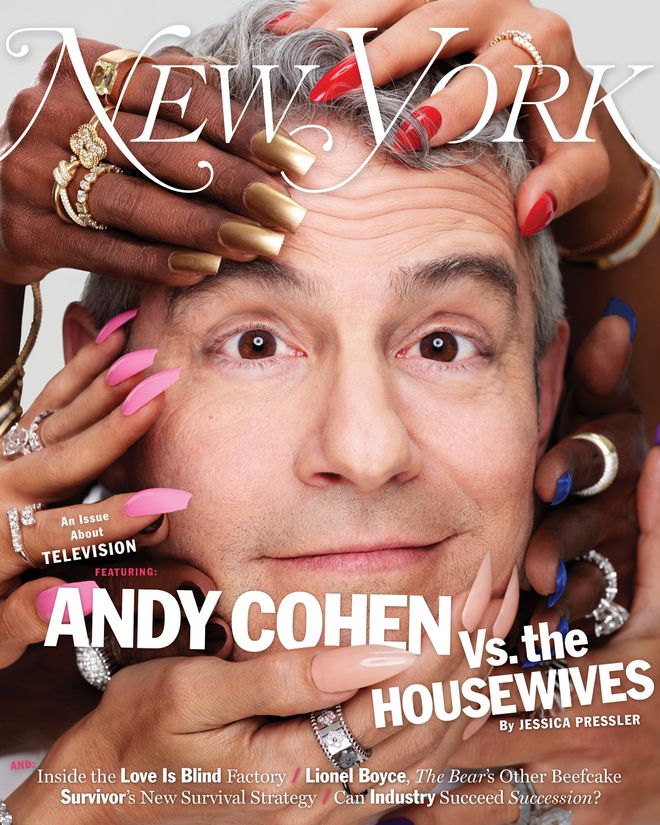
This article was featured in One Great Story, New York’s reading recommendation newsletter. Sign up here to get it nightly.
Andy Cohen thinks about his cancellation a lot. What will it look like? When will it come? “It’s fascinating to me, the idea that you could say something and everything would be pulled away from you,” he says. It was a bright afternoon in May, and we had been talking about an event he had coming up, “An Evening With Andy Cohen,” at the 92nd Street Y.
Cohen had been thinking he might read an excerpt from his 2012 memoir, Most Talkative, but now he was having second thoughts. “It’s called ‘Cry Indian,’ and it’s about a prank I played on my parents where I convinced them that I thought I was a Native American,” he says. It was a sweet, relatable story — about a joke gone too far and how being funny can sometimes tip into being mean — but he worried that the title and nature of the prank wouldn’t land with a 2024 audience. “You have to be smart about what you say because there’s no nuance anymore,” he says. “People are just waiting to be outraged by every little thing.”
This is a healthy concern for any public figure to have, particularly one who, like Cohen, has built his career skipping up to the line of propriety. As the host of the reunions for the various franchises of The Real Housewives, which he executive-produces, a daily live radio show, and the nightly Watch What Happens Live, he’s known for his willingness to go there, plowing into sensitive subjects, addressing unspoken issues, and asking devilishly impertinent questions with his charming, crooked grin.
In This Issue
More From
the Television Issue
See All
“I mean, he asked Shaq how — big he is,” sputters Anderson Cooper, who often plays the straight man to Cohen’s instigator, most famously on the duo’s annual New Year’s Eve broadcast from Times Square, during which Cooper once memorably held Cohen back by his collar as he ranted drunkenly against outgoing mayor Bill de Blasio. “I would never in a million years ask that question or even think to ask it,” Cooper continues needlessly. “But Shaq not only answered; he gave a really funny answer. With props.”
Cohen wouldn’t have it any other way. “I like being provocative,” he says. “It makes me feel alive in a weird way. It’s dangerous. It’s spontaneous. I think it sometimes gets to the heart of who a person is. If you navigate it well, it can become something incredible and intoxicating. It’s like dancing on the water: Are you going to go over or not?”
On the whole, Cohen has navigated it very well. Since leaving his desk job as a Bravo executive over a decade ago, he has managed to ascend to a level of fame that feels increasingly difficult to achieve. He’s America’s gay best friend, as his friend John Mayer put it. Sesame Street had him on to define popular for Elmo. In the weeks I spent with him, nearly every stranger who approached him began with some version of “I love you.”
Still, he worries. “Sometimes at night I’ll be in bed and I’ll think, Huh, did I say something?” Cohen says. “I’m always waiting for the thing that’s going to make it all fall down.”
Earlier this year, it seemed as if that time might have come after attorneys for former Real Housewives filed lawsuits against Bravo and its parent company, NBCUniversal — the product of a long-simmering “Reality Reckoning” that pointed to Cohen as, among other things, an “omnificent ringleader” with a “proclivity for cocaine usage” whose “discriminatory and retaliatory conduct” created a “rotted workplace culture.”
“It is inconceivable that Mr. Cohen remains in his post in spite of this behavior and harkens back to the bad old days of Matt Lauer and NBC News when profits were prioritized over people,” wrote Bryan Freedman, one of the Los Angeles entertainment lawyers leading the Reckoning. There would be more lawsuits to come, he added, telling Variety, “This is going to end up being a war, and I’m going to lead the war.”
NBCU and Cohen’s lawyers sent out the usual statements denying the accusations, specifically demanding a retraction of the cocaine allegation. But to a casual observer, it looked like the beginnings of a familiar story: the unraveling of a powerful man in an industry that was already widely regarded to be toxic and depraved. Lord knows it wouldn’t be the first time Elmo had put his furry mitts in the wrong hands. NBCU announced it was conducting an investigation, and rumors swirled that Cohen was hiring a crisis-PR team and negotiating a “departure package.” Chairman Frances Berwick delivered a chilling line: “Andy is a very sort of specific and exceptional talent, and he really is the face of the network,” she told Variety. “But I’m also happy to say that — and I think we’ve proved this over and over again — we’ve got 160 talents here who are also big faces of the network. And we’ve also been able to replace them.”
But then nothing happened. Instead of quietly disappearing while the courts worked out his fate, Cohen kept up his regular patter on the radio and on television. He went to parties, posed for pictures, helped Sarah Jessica Parker see her way down the red carpet at the Met Ball, and continued asking impertinent questions.
“The other night, we went to a party for Stephen Colbert,” his friend Amy Sedaris recalled recently. “And I turn around and he’s asking Colbert, ‘Is there anyone in your family that you don’t get along with?’”
Eventually, Bravo and NBCU announced that Cohen had been cleared in their outside investigation and that they were renewing Watch What Happens Live, which celebrates its 15th anniversary this summer, through 2025. Although no retractions of any legal claims were issued and the lawsuits were still pending, Cohen reacted as though that were the end of it, appearing on the cover of The Hollywood Reporter straightening his tie above the headline WHAT, ME WORRY?
Still, maybe it’s better not to tempt fate: “I was thinking about reading an excerpt from my first book,” Cohen says to the audience at the 92nd Street Y in a way that suggests he’s still considering it. But then he changes his mind. “Saturday, January 1st, 2022, New York City,” he reads instead. “Claire McCaskill texted the trashing of de Blasio was epic …”
There aren’t many things anyone can tell you about Andy Cohen that he hasn’t already said himself. Things he reveals in his memoirs (there are four, three in diary form) include:
That he is a “power top.”
That he accidentally called Snoop Dogg “Spook” but deleted it from the broadcast. (It turned out fine; they smoked a blunt afterward).
That he once told Mark Consuelos and Kelly Ripa’s kids about sleeping with a guy who had a uniball.
That he and Sedaris once did ketamine before going to the Polo Bar.
That he has seen the boobs of at least three Housewives: Vicki, Tamra, and Kim.
“I mean, it’s like he blabs everything,” says his mother, Evelyn Cohen, 87, who, on a Zoom call with his sister, Emily, struggles to come up with a story her son hasn’t told about his childhood growing up in St. Louis.
“Did he tell you about the Indian boots?” says his mother. “That was bad.”
Despite the confessional nature of his books, Cohen is less forthcoming in interviews, maybe because his line of work has made him fearful of allowing anyone else control over his story. In any case, Cohen’s story is at this point well known: Growing up in St. Louis, he was a soap-opera-obsessive kid who wanted to be on television “as himself,” but when he landed in New York in the early ’90s, someone told him he couldn’t because of his wonky eye. So instead he got a job as a producer at CBS News and became a fun party-boy-about-town. “He has that magnetic energy,” says Sedaris, who met him through Parker. “He can’t sit still. I don’t know the type of dog he is, but he’s always, like, walking down the street, looking around, ears flopping. Always promiscuous, always has his eye out.”
He met Cooper when someone tried to set him up on a date. Cohen blew it: “I was like, ‘Your mom’s Gloria Vanderbilt.” And he was like, ‘I’m not into you.’”
Their mutual friend Barry Diller eventually hired him at Trio, which merged with Bravo after both were absorbed into NBCUniversal. Cohen was working as the vice-president of programming in 2004 when a California production company came in with the tapes of what would become The Real Housewives of Orange County: “Orange County to me was the Knots Landing of The Real Housewives,” he says. “They’re in cul-de-sacs. They all go to the same club.” But he got nervous when he saw the now-famous format the production company had come up with for the intro, which featured the women alongside contextless quotes from the show (“I don’t want to get old,” “85 percent of the women around here have had breast implants,” “He’s pretty much keeping me”).
“I was like, Oh my God, the women, they’re going to hate this,” he says. But when it premiered, in March 2006, they loved it: “So that was my first sense — Oh, these women are in for the ride. So okay, let’s go.”
Cohen’s enthusiasm for that show and others on the network led his boss to suggest he start blogging about them on the Bravo website, which led to his doing guest spots promoting Bravo’s programming and eventually hosting the network’s reunion specials, which was how he caught the eye of Michael Davies, a British producer who had imported the wildly successful Who Wants to Be a Millionaire? to the U.S. “He was asking Flipping Out host Jeff Lewis about the implants in his lips,” Davies recalls. “And I had one of those moments where I could see the future.”
Obama had just taken office, and the national mood was optimistic. Cohen’s irrepressibility felt right for the moment. “I saw him as a kind of poster boy for post-ironic, positive television,” says Davies, whose company, Embassy Row, produces Watch What Happens Live.
The show, which started as an experiment in the summer of 2009, mirrored the loose, chatty vibe of the early internet in both its tone and format: On Thursday nights from midnight to 12:30 a.m., Cohen and whatever Bravo personality or celebrity he could wrangle played drinking games and took calls from viewers and questions over Twitter from a tiny studio in Embassy Row’s offices. The set was modeled on Cohen’s apartment, decorated with his own furniture. There was no air-conditioning.
“In the beginning, I was like Albert Brooks in Broadcast News,” Cohen recalls. “I couldn’t control my sweating.”
Afterward, they would review the tape and then head to the Boom Boom Room, the club at the top of the Standard that reminded Cohen of Nexus, the favored haunt of Erica Kane on All My Children. “We would roll in at 1:15 a.m. and stay until four,” Cohen says. “It was great.”
He knew he was famous after Teresa Giudice shoved him to the side during a heated altercation on the season-two reunion of The Real Housewives of New Jersey. “I was out at the beach on vacation, and it was on Access Hollywood, and there was a big picture of it in the New York Post, and people were talking about it on Twitter,” he says. By then, Watch What Happens Live had hit 2 million viewers. Bravo extended it to two, then five days a week, which afforded Cohen more time to discuss non-Bravo subjects and host bigger and better guests. Meryl Streep came on and played Marry, Shag, Kill. Hillary Clinton drank from the “Shotski” — a ski with shot glasses attached to it, a gift that had been given to Cohen by Jimmy Fallon and his wife. Oprah told Cohen he “carried the light.”
In 2013, Cohen was finally able to drop his day job and negotiate a deal for a mostly on-air role at Bravo that allowed him to remain the host of the network’s reunion specials and retain his executive-producer credit on The Real Housewives, which was rapidly becoming its own multiverse with six active franchises and numerous spinoffs. (There are a lot more now.)
Cohen likes to refer to The Real Housewives as a “sociological time capsule,” and as the start-up era roared into being, the series gained a reputation as a launching pad for businesses, largely due to the success of The Real Housewives of New York’s hustling chef, Bethenny Frankel, who had famously sold the beverage division of her company, Skinnygirl, for $100 million. The Housewives, newly redefining themselves as “entrepreneurs,” began using the platform of the show to hawk everything from brands of flavored vodka to their (questionable) singing careers.
“They are mothers, they are entrepreneurs, they are wives, they are women,” Cohen told Gloria Steinem on Watch What Happens Live in 2015.
“It is women all dressed up and inflated and plastic surgery and false bosoms and not getting along with each other,” Steinem replied stonily.
Cohen was visibly dismayed at the time, and nearly a decade later, this point of view still bothers him.
“I think it’s a feminist show,” he says. “And I know a lot of feminists, by the way, who view this as a great feminist show — Roxane Gay, Camille Paglia, Sarah Paulson — just women that are very active in women’s issues, who view this as a great feminist show. The other great thing that I love about this show is that I love that we have put more women over 50 on television.”
Cohen loves women, he adds. “Women are precious to me,” he says, rattling off a list of the many who made an impact on his life, including but not limited to his mom, his mentors at Bravo, Madonna, Diana Ross, and Cher.
And he respects women, especially the Housewives. “I really respect the Housewives so much because they open up their lives in a sometimes very raw way, and I think that would be really hard to do,” he says. “I don’t know if I have the constitution to do that on television. So the strength of these women ultimately to share that and then open themselves up for all sorts of conversations is something that I admire. So that’s why if someone says it’s about fighting or Gloria Steinem says this, I just think it’s a lazy trope. I think that if it was just about women fighting, it would not still be on the air 18 years later and there wouldn’t be ten shows going. There has to be humanity and there has to be humor, and you have to connect with these women. And so, obviously, there is drama and conflict, but there’s a whole lot more.”
As the Housewives rolled on, becoming an even bigger cultural and economic force, so did Andy Cohen. He started his own book imprint and two radio channels with SiriusXM and, in 2017, replaced Kathy Griffin as Cooper’s CNN New Year’s Eve co-host. “Every day when I turn on my phone, I see content that Andy Cohen is responsible for,” says Cooper. “Much more so than any late-night host. He makes it look easy. But he is paddling really, really fast under the water.” Said like the true son of a swan.
“For the record, I would like to point out that I have wound up being the straight man of the two of us,” Cohen says. “Maybe except for the year that I went off on de Blasio. But it’s usually him in a puddle of giggles and I’m hitting the commercial breaks and I’m moving it along. I mean, that’s what winds up happening because he’s a lightweight.”








Hi, Andy Cohen,” says Cohen’s 5-year-old son, Ben, scooting into the park near his apartment in the West Village. “He’s totally taking the piss out of me,” Cohen says. “Because he thinks it’s so funny that people come up to me all the time and are like, ‘Andy Cohen, Andy Cohen.’”
Cooper likes to say Cohen has more fun being famous than anyone, and Cohen agrees. “I lived in New York for 15 years without being able to get reservations at restaurants,” he says. “So yeah, of course I’m going to enjoy it.”
Cohen had a lot of famous friends by the time he became famous. “So I had a sense of how to behave,” he says. “And then I had a lot of people who were normal people who were becoming famous, Housewives who were turning into beasts as a result. So I’m ultimately very appreciative of the whole thing. And you have to keep that perspective. You can’t go all in on it. Because it can all go away tomorrow.”
After he published his third memoir, Superficial, in 2016, Cohen found himself at a crossroads: “When you see what you did every day for two and a half years, as fabulous as it was, it does make you look at your life: Okay, well, is this what it’s going to be? I had just turned 49, and I was like, This is like the last exit to having kids. I was financially to the point where I knew that I could do it and have the help that I needed if I did it alone. And I also felt like, You know what? If I never go to the Vanity Fair Oscar party again, I’m going to be okay.”
Two years later, in December 2018, he summoned five of the most important women in his life — Housewives Teresa Giudice from New Jersey, Kyle Richards from Beverly Hills, NeNe Leakes from Atlanta, Ramona Singer from New York, and Vicki Gunvalson, “the OG of the OC” — to Watch What Happens Live to announce he was going to become a father via surrogate.
The following month, they threw him a Star Is Born–themed baby shower in Beverly Hills. It was the first time so many different Housewives had been in the same room, and the event was instantly hailed as historically significant. “It was like the Avengers finale,” Cohen later said.
And it was a finale, in a way.
The year was 2019. The world was a different place from when Cohen and the Housewives started out. A reality star had been elected president. The country was divided. The world felt increasingly unstable, and so did the world of The Real Housewives.
“The show went from silly humor about middle-aged women getting drunk and being delusional about their status and having funny, petty arguments, to Housewives investigating and doing opposition research and making up false story lines and leaking stories on each other and trying to get one another fired,” says one former New York Housewife. After she was fired, she came across a widely circulated online video of Cohen’s baby shower in which Lisa Rinna encourages the Housewives to get up on the tables and dance. “Dance for Andy and his baby,” she instructs. “Dance like your fucking lives depend on it.”
“I just thought it was such a cringe moment,” says the former Housewife. “Because that’s the dynamic. Everyone just dances for Andy Cohen.”
-
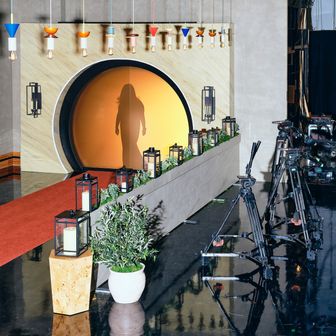 The Love Machine
The Love Machine -
 Industry Goes for Broke
Industry Goes for Broke -
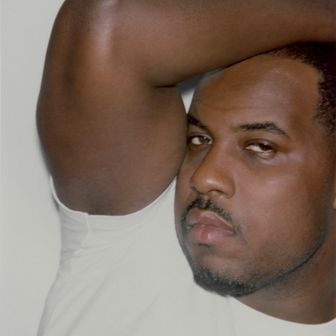 Lionel Boyce Is The Bear’s Secret Sauce
Lionel Boyce Is The Bear’s Secret Sauce -
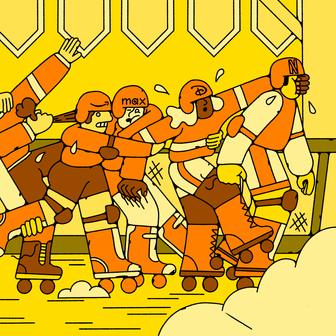 The 2024 Streaming Power Rankings
The 2024 Streaming Power Rankings -
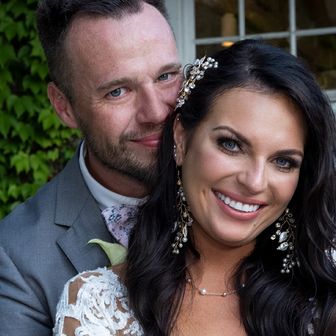 Every Engagement, Breakup, and Marriage in Love Is Blind
Every Engagement, Breakup, and Marriage in Love Is Blind -
 The Survivor Eras Tour
The Survivor Eras Tour -
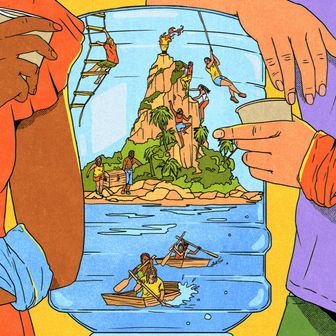 Firing Jeff Probst Isn’t Enough
Firing Jeff Probst Isn’t Enough -
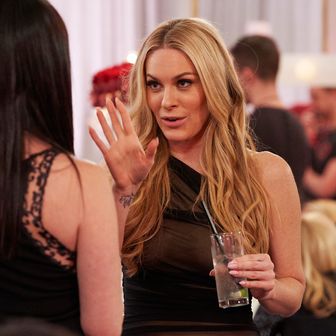 (Almost) Every Reality TV Lawsuit Right Now
(Almost) Every Reality TV Lawsuit Right Now -
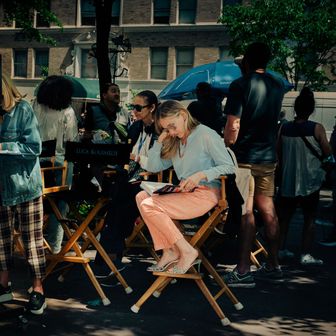 And Just Like That … Brings Carrie Back to Gramercy Park
And Just Like That … Brings Carrie Back to Gramercy Park
-
 The Love Machine
The Love Machine -
 Industry Goes for Broke
Industry Goes for Broke -
 Lionel Boyce Is The Bear’s Secret Sauce
Lionel Boyce Is The Bear’s Secret Sauce -
 The 2024 Streaming Power Rankings
The 2024 Streaming Power Rankings -
 Every Engagement, Breakup, and Marriage in Love Is Blind
Every Engagement, Breakup, and Marriage in Love Is Blind -
 The Survivor Eras Tour
The Survivor Eras Tour -
 Firing Jeff Probst Isn’t Enough
Firing Jeff Probst Isn’t Enough -
 (Almost) Every Reality TV Lawsuit Right Now
(Almost) Every Reality TV Lawsuit Right Now -
 And Just Like That … Brings Carrie Back to Gramercy Park
And Just Like That … Brings Carrie Back to Gramercy Park
It is a testament to Cohen’s great interpersonal skills that he was able, for many years, to preside over a large number of exceptionally volatile personalities before they began to turn on him. By the end of the decade, the divide between them was clear. Cohen was beloved and rich, so in control of his narrative that even his own mother couldn’t tell you something he hadn’t already said himself.
The Housewives, meanwhile, were essentially gig workers who had forfeited control of their images in service to jobs that offered them high status but didn’t even provide them with health insurance. So far, the $100 million payout hadn’t materialized for anyone but Frankel.
Evelyn Cohen didn’t really watch the Housewives, but even she could see where this was going. “People were just becoming themselves on steroids,” she said. “You play with fire, you get burned with these people.”
“HW this year is literally a microcosm of what the country is going thru,” Leah McSweeney texted Cohen on December 30, 2020, presumably in reference to now-infamous social issues that arose during the filming of season 13 of The Real Housewives of New York, the details of which would eventually become part of the mudslide mess that slowly fell into Cohen’s lap over the next few years.
It was, of course, the pent-up resentment of the pandemic that set the ball rolling: Leakes, the breakout star of The Real Housewives of Atlanta, frustrated with her contract negotiations with the network and her co-stars, slammed her laptop shut during a virtual reunion in the spring of 2020. Leakes had quit before, but this time, things spiraled into a public feud and eventually a lawsuit that had her accusing Cohen, Bravo, and NBCU of racism and sabotaging her career. “Ole racist,” she tweeted. “No one knew you until YOU knew me. I’m ICON.”
Leakes eventually withdrew her lawsuit for reasons unknown (she declined, through her lawyer, to comment), but she resurfaced her claims during the so-called Reality Reckoning last year, appearing on Frankel’s podcast. “I thought we had a good relationship,” Leakes told Frankel of Cohen, but “I don’t think he ever liked me.”
According to Cohen, he was taken by surprise when Frankel, apparently inspired by the Hollywood writers’ strike and out of the goodness of her heart, took to TikTok this past July to urge her fellow — well, poorer — reality stars to form a union and to direct their complaints about exploitation to her lawyers, Bryan Freedman and Mark Geragos, who were sharpening knives that might as well have had Cohen’s face on them.
“Please be advised that the day of reckoning has arrived,” read the startlingly verbose letter Freedman sent to Bravo’s parent company. “The sordid and dark underbelly of NBC’s widely consumed reality TV universe has remained under wraps for far too long.”
Out of all of the Housewives, Cohen had been especially close with Frankel. They talked all the time, and since they both lived in New York and had houses near each other in the Hamptons, they met up occasionally. In their last text exchange, they had talked about taking a beach walk together.
This “sustained attack,” as Cohen referred to it, went on for months. Vanity Fair published a huge story about it, which included, among other things, details about Real Housewife of New York Ramona Singer’s tone-deaf behavior with new Black cast member Eboni K. Williams and other Black employees at the network, which were so damning it wasn’t even okay to joke about how hilariously bad at texting Singer was.
Then the lawsuits started coming. Marco Vega, a butler at Dorinda Medley’s Bluestone Manor in Massachusetts, sued Bravo and NBCU claiming he had been sexually assaulted by Brandi Glanville, a former Real Housewife of Beverly Hills, during the filming of Ultimate Girls Trip: Return to Bluestone Manor in 2021. This prompted Glanville to go on a Twitter rampage in which she blamed producers for encouraging her to get drunk and rip off the butler’s shirt. Caroline Manzo, a Real Housewife of New Jersey, then filed a lawsuit against Bravo and NBCU saying she had been sexually assaulted during a different Real Housewives Ultimate Girls Trip, in Morocco, by Glanville, who obviously should never have been there because look what she did to the butler.
Then Glanville — who called the accusations of sexual assault “absurd” — felt like the network was hanging her out to dry and accused Cohen of sexual harassment for sending an inappropriate video that was obviously a joke, but he still had to apologize.
Then McSweeney — who had famously gotten drunk and nearly naked and thrown a lit tiki torch across Singer’s lawn in season 12 of Real Housewives of New York, then returned for the following season sober and Jewish — filed a 109-page lawsuit that accused Bravo, NBCU, and the production companies of a wide range of offenses, including, but not limited to, failing to accommodate her recent conversion to Judaism by serving her pork and retaliating against her when she refused to drink alcohol, singling out Cohen in particular for “engaging in cocaine use with Housewives” and other “Bravolebrities” whom she alleged he gave more favorable treatment.
Cohen might have been a fan of soap operas, but he didn’t like being cast in this one. He has never done cocaine with cast members, he says. “If you read my books, I tell you every drug I do.”
“It didn’t feel great,” says Deirdre Connolly, the longtime executive producer of Watch What Happens Live, the office of which, incidentally, does not look like a coke den unless your jam is doing coke off laminated Uline cubicle desks with fabric walls. “It feels like so disconnected to what our day-to-day is. I look around and I see real friendships, and people laugh every day. It’s chill and then all of a sudden it’s kind of like, Wait, what are people saying? This is not our workplace. That’s not true. And it’s like something insidious can seep in even when you really try your best not to let it.”
Cohen kept doing his shows in the months that followed, but an almost visible Charlie Brown scribble of sadness hovered around his cartoon edges. “Andy Cohen has gone from a curious gossip with a twinkle in his eye to an exhausted peacekeeper with a show to run,” said one X user.
“There was a lot of noise,” he recalls. “And I was definitely sad about it. But I’m telling you — and it sounds like bullshit — but when I walked into BravoCon, it was like, Dude, get off Twitter. That’s a bunch of clickbait. This is sanity.”
Sane is not a word one might normally use to describe BravoCon, an event where, last year, 27,000 fans — otherwise known as Bravoholics — in hot-pink BRAVO-LOVIN’ BITCHES T-shirts descended on Las Vegas to drink frosé at panels like “The Summer House Always Wins: Presented by State Farm” and attend “Pat the Puss” dance classes.
Bravo fans had been watching the Reckoning unfold, and they had a different take on the lawsuits from the ones they had seen in the media. “I think the problem is that there’s so many coming at the same time that people, especially people that are new to these, are taking it as a whole attack against Bravo,” says Cesie Alvarez, a Los Angeles-based lawyer and a co-host of The Bravo Docket, a podcast that breaks down Bravo-related legal disputes. “But when you really look at them individually, what are the arguments here? Who are the players? What is the context? What do we know? The fans of the show have all the context. We’ve watched all the seasons.” While some of the allegations were disturbing, like Manzo’s description of her interaction with Glanville, Agnotti says, “There are others where, especially as a die-hard fan, you look at it and you go, This doesn’t align with what we know from watching the show or other narratives that you’ve put out there.”
Like that of McSweeney, who talked about her drinking history in great detail on the show. “Leah McSweeney’s complaint had a lot of stuff thrown in there that really wasn’t relevant to the actual claims she was making,” adds Bravo Docket co-host Angela Angotti. “My opinion on that was that it’s attention seeking. They knew the press would jump onto that. McSweeney says that Andy Cohen did cocaine with other celebrities but not her. I mean …”
“He won’t do that because it’s expensive,” points out Ben Mandelker, one of the hosts of a different very funny Bravo-focused podcast, Watch What Crappens. “No one is like, Oh, cocaine is free.”
“Someone offering their coke sounds like a nice person to me,” adds his co-host, Ronnie Karam, “I think the man should get a fucking statue in Times Square … We’re vilifying him? I’ve never been this much of a fan.”
Bravo fans seemed to have fairly quickly reached a consensus on the real impetus for the Reality Reckoning, which comes up almost immediately during the Q&A portion of Cohen’s talk at the 92nd Street Y, where a woman in a button-down shirt stands up and says, to uproarious applause, “Fuck Bethenny Frankel!”
According to the Bravoholics, who have examined the evidence with the feverish attention of Heather Gay, it all goes back to a December 2022 episode of Watch What Happens Live. Cohen had invited Frankel onto the show to “hash out,” as he puts it, a public feud they’d been having in the tabloids over a new, Housewives-specific podcast Frankel had started called ReWives.
Cohen said he thought it was hypocritical that Frankel, who had “been trashing the Housewives publicly for the last three years,” was suddenly embracing the franchise.
Frankel seemed offended. “I actually haven’t been ‘trashing’ the show,” she said. “I’ve said it wasn’t for me. Because I do think it was toxic … How could I be on for more than a decade and not have reflections to share? I’m not trashing people on the show.”
“Well you called it boring, toxic, women against other women.”
“I didn’t call it boring,” Frankel said. “I called it toxic, which I think it has — ”
“You called RHONY Legacy boring … on your TikTok,” Cohen said, turning to the program’s other guest, Jeff Lewis (the guy with the lips). “Jeff, are you enjoying this?”
“I actually am uncomfortable,” Lewis said.
By the end of the show, it appeared to a civilian that they had smoothed things out, but hard-core Bravoholics knew better. The knew Bethenny. They’d been watching her. For years. “This is a woman who we have never, in 14 years, seen her maintain a friendship with anyone. She cannot be close to anyone,” reported the host of a popular fan podcast who asked not to be named because she is afraid of Frankel. It’s a popular sentiment. “She cannot be close to anyone. She has done incredible work with charity, but when it comes to interpersonal relationships, we have not seen her hold one friend. This is the next turn of the screw for her. She’s turning on the person who has championed her. Who loved her.”
“She felt like, Oh, they insulted me,” the anonymous host went on. “So now she is creating this role for herself as a vigilante.”
“Once you see it, you can’t stop seeing it,” said Karam, of Watch What Crappens, pointing to Frankel’s suspiciously self-serving decision to bring Rachel Leviss — the other woman at the center of Scandoval, who is now using Freedman and Geragos to sue her ex and his ex-girlfriend — into her podcast network. “Her fingerprints are on everything!”
Frankel did not respond to a request for comment through her publicist, whose response, “This story is so old lol,” suggests she may have moved on. Frankel last week was crusading against Chanel, which she claimed had treated her differently when she went to the store in regular clothes than the staff did when she went back in a Chanel suit.
“We all know what happened here,” says Casey Wilson, co-host of the podcast Bitch Sesh. “We know these women. They are our friends. They are our insane aunts. We have watched them for hundreds of hours on TV and on social media. In this world, everyone is who they are, all the time.”
Including Andy Cohen. “This is my happy place in this universe,” he says, meaning Bravoland, which isn’t really a place at all but maybe more a state of mind. He was on his way to an event in D.C., where a member of Congress was interviewing him about his most recent book. (“You have no idea what kind of refuge you provided us through January 6th,” a member of the Foreign Relations Committee said on his way out.)
“It’s a glorious world. It’s fun. I love Bravoland. If you want to go to a different world, great. Go to a different carnival, but we’re having a lot of fun in here.”
He isn’t going anywhere. “I’ll keep doing the Bravo stuff for as long as Bravo will have me. Listen, age is just a number, man.”
I try to make a joke about how he probably shouldn’t quote R. Kelly, just in case.
For a second, he looks nervous. “Is that an R. Kelly quote?” he says. “I didn’t know that. I didn’t know that was an R. Kelly quote — wait, he’s not the only one who — I mean, as long as I’m having fun, it’ll be great.”


